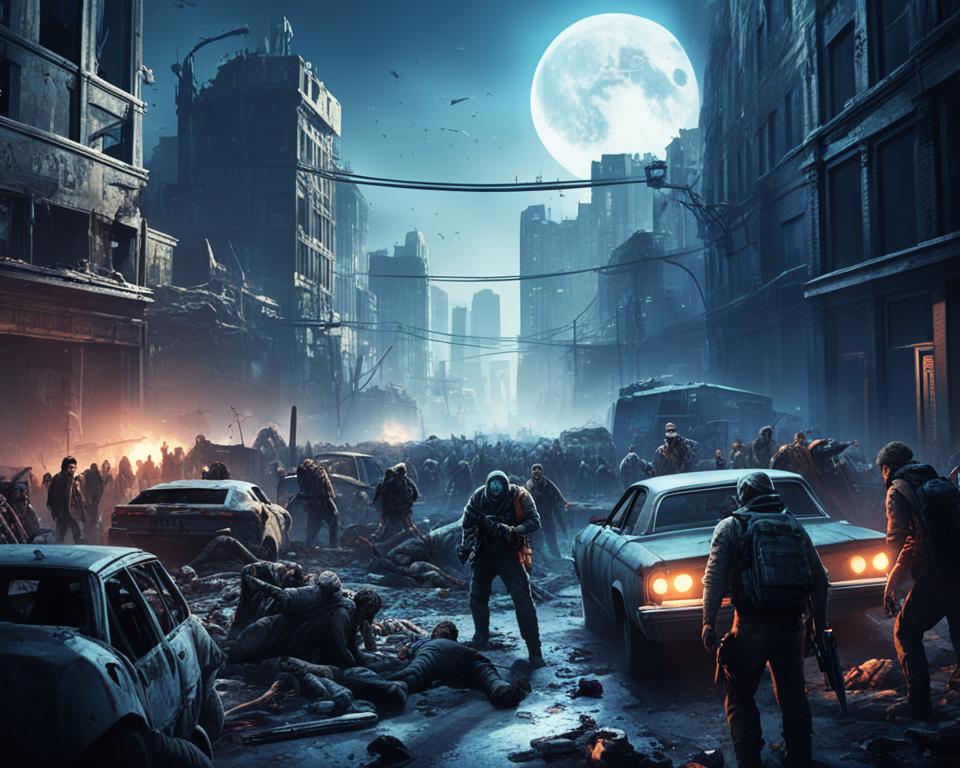In recent years, zombie dramas have reached unprecedented levels of popularity, captivating audiences around the world. From gripping television series to blockbuster movies, the undead have become a cultural phenomenon that shows no signs of slowing down.
But what exactly is it about these zombies that has us so enthralled? Why do we find ourselves irresistibly drawn to tales of the undead? In this article, I will dissect the enduring fascination with zombie dramas and analyze the factors that make them so captivating.
From their metaphorical significance in media to the psychological impact of apocalyptic storytelling, we will explore the various aspects that contribute to our zombie obsession. We will also dive into how zombie dramas serve as a mirror to contemporary anxieties and as social commentary on societal decay.
But it’s not just the storytelling and themes that draw us in. The art of creating convincing undead characters through makeup and special effects plays a crucial role in the success of these dramas. We will examine the craftsmanship behind zombie makeup and the magic of special effects that heightens the horror.
Furthermore, we will travel through time and across cultures to understand the evolution of zombie entertainment. From the classic horror movies of the past to the modern-day TV shows that redefine the genre, we will trace the roots of zombie dramas and explore their journey to mainstream popularity.
As we delve into international takes on the undead mythos and forecast the future of zombie storytelling, you will gain a comprehensive understanding of the allure and impact of these zombie dramas.
Key Takeaways:
- Zombie dramas have reached unparalleled levels of popularity in recent years.
- There is a strong fascination with the undead, and this article aims to explore the reasons behind it.
- Zombie dramas reflect societal fears and anxieties, making them highly relatable to audiences.
- Zombies serve as metaphors in media and provide a platform for social commentary.
- The art of zombie makeup and special effects plays a crucial role in the success of these dramas.
The Eternal Allure of the Undead: A Cultural Phenomenon
The allure of the undead has transcended time, capturing the collective imagination and becoming a cultural phenomenon. From movies to TV shows to video games, zombies have invaded popular culture and claimed their place as iconic figures in the realm of entertainment. Their presence is undeniable, with zombie pop culture permeating various mediums. But what exactly is it about the undead that continues to captivate audiences?
Zombie-themed movies, shows, and other media have had a profound impact on popular culture. They have spawned countless fan clubs, conventions, and dedicated communities, drawing enthusiasts from all walks of life. The appeal of the undead lies in their ability to tap into our primal fears and morbid curiosity. They embody the fragility of human existence and challenge our concepts of life and death.
Their lasting appeal can be attributed to various factors. One is the metaphorical significance of zombies in media. Zombies often represent societal decay, acting as a mirror to contemporary anxieties. They symbolize the threats and issues that plague our world, allowing us to explore these themes in a fictional context.
Zombie pop culture also provides a platform for exploring the psychological impact of apocalyptic storytelling. It allows us to delve into our fears, anxieties, and survival instincts. By experiencing these narratives, we are able to confront our deepest emotions and gain a better understanding of ourselves.
Zombie-themed entertainment is not limited to mere horror; it has evolved into a rich tapestry of storytelling. With subgenres ranging from comedic to romantic, zombie pop culture offers something for everyone. Its versatility ensures that there is always a new twist to the undead narrative, appealing to a wide and diverse audience.
In conclusion, the allure of the undead has cemented its status as a cultural phenomenon. From the metaphorical significance of zombies to the exploration of human psychology, the fascination with zombie pop culture shows no signs of waning. As society continues to evolve, so too will our obsession with the undead, ensuring that zombies remain an enduring and captivating aspect of our collective imagination.
Deciphering Our Zombie Obsession: What Makes the Undead So Compelling?
In our quest to understand the enduring fascination with zombies, it is crucial to explore the factors that make these undead creatures so compelling to audiences. From their metaphorical significance in media to the psychological impact of apocalyptic storytelling, zombies have a profound effect on our collective imagination.
The Metaphorical Significance of Zombies in Media
Zombies have transcended their horror origins and evolved into powerful metaphors within popular media. They serve as symbols of societal fears and anxieties, reflecting our deepest concerns about the world we live in. Whether it’s the relentless pursuit of consumerism or the ever-present threat of class warfare, zombie dramas provide a platform for exploring these complex issues in a metaphorical context.
Through their decaying bodies and insatiable hunger, zombies represent the decay of society and the loss of humanity. They remind us of the fragility of civilization and the consequences of unchecked greed. By confronting these themes through the lens of the undead, zombie media allows us to grapple with our own societal challenges and question our values.
The metaphorical significance of zombies also extends to our mortality and the inevitability of death. These undead creatures embody our deepest fears of facing our own mortality and the existential dread that comes with it. Their relentless pursuit of the living serves as a constant reminder of the fleeting nature of life and the fragility of our existence.
Exploring the Psychological Impact of Apocalyptic Storytelling
Apocalyptic storytelling, often featuring zombies, taps into our collective psyche and resonates with viewers on a profound level. The destruction of the world as we know it, the struggle for survival, and the breakdown of society create a compelling narrative that captivates audiences.
Psychologically, apocalyptic storytelling allows us to confront and process our deepest fears in a controlled environment. By immersing ourselves in these stories, we can explore our own survival instincts, examine our moral compass, and contemplate what it means to be human in the face of chaos.
The post-apocalyptic world depicted in zombie dramas serves as a mirror, reflecting our own anxieties about the state of the world. It allows us to explore our fears of societal collapse, environmental disasters, and the breakdown of social order. Through the lens of the undead, we can confront these fears and seek solace in narratives that show resilience, courage, and the indomitable spirit of humanity.
Apocalyptic storytelling also offers a sense of catharsis, allowing us to experience intense emotions in a safe context. The adrenaline-pumping action, suspenseful moments, and emotionally charged character arcs provide an outlet for our pent-up emotions and offer a temporary escape from our everyday lives.
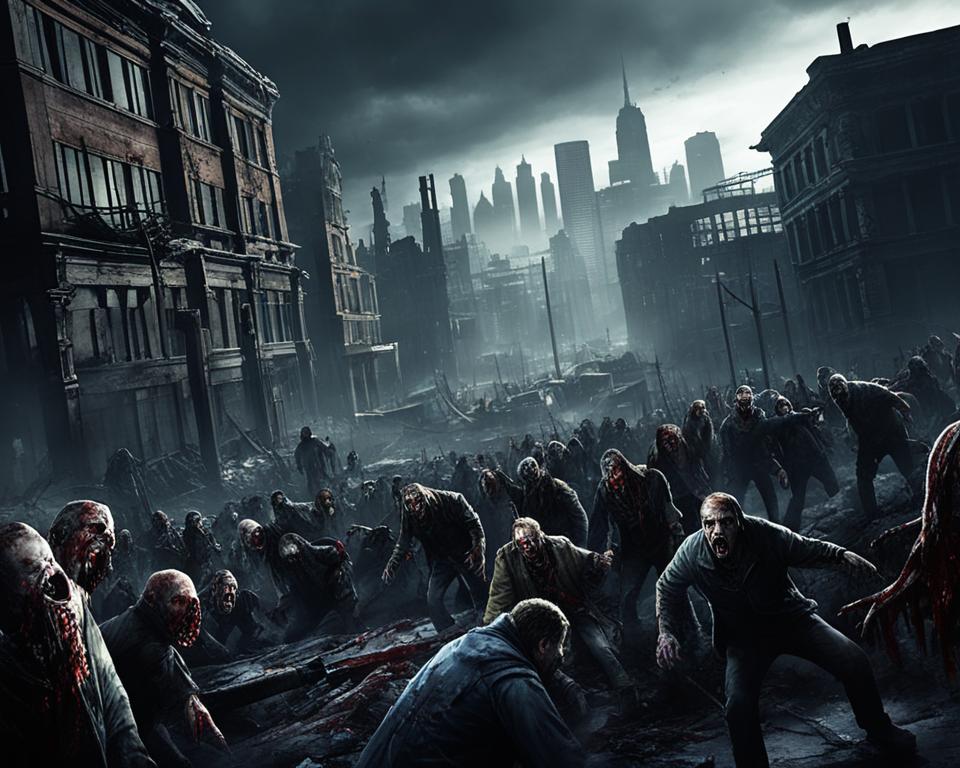
Societal Decay and Undead Symbolism: Zombies as Social Commentary
In the world of zombie dramas, the undead serve as more than just brain-hungry monsters. The portrayal of zombies in popular media often carries a deeper meaning, acting as a vehicle for social commentary and a reflection of contemporary anxieties. These shows use zombies as symbols of societal decay and explore themes such as consumerism, class warfare, and the breakdown of social structures.
Zombie Dramas as a Mirror to Contemporary Anxieties
Undead symbolism runs deep in zombie dramas, acting as a metaphor for the fears and struggles of modern society. These shows tap into our collective anxieties, highlighting the fragility of the world we live in and the potential for catastrophic societal collapse. By depicting a post-apocalyptic world overrun by the undead, these dramas create a mirror that forces us to confront our deepest fears and examine the consequences of our actions.
“Zombies present an exaggerated version of societal issues, forcing viewers to critically analyze the state of our world and question our own role in society.” – Expert zombie analyst
This exploration of contemporary anxieties through the lens of the undead allows viewers to engage with these complex issues in a way that is both entertaining and thought-provoking. By presenting societal decay in a dramatic and exaggerated form, zombie dramas encourage critical thinking and reflection on the state of our world.
Connecting the Dots: Zombies, Consumerism, and Class Warfare
Zombie dramas often delve into themes of consumerism and the pursuit of material possessions. The insatiable appetite of the undead can be seen as a commentary on our own insatiable desire for more, the never-ending quest for wealth and possessions that often leaves us feeling empty and disconnected from what truly matters. Through the lens of the undead, these shows shine a spotlight on the dangers of mindless consumption and the consequences of placing too much value on material wealth.
Furthermore, zombie dramas frequently explore the theme of class warfare, depicting the breakdown of societal hierarchies and the erosion of social order. In these narratives, the undead act as a leveling force, indiscriminately consuming both the rich and the poor. This serves as a powerful commentary on the inherent inequality and injustice in our society, challenging viewers to question the systems that perpetuate these divisions.
The use of undead symbolism in these shows enhances their social commentary, allowing viewers to engage with complex issues through the lens of a fictional world. By presenting societal decay and exploring themes such as consumerism and class warfare, zombie dramas provide a compelling platform for examining and questioning the state of our world.
| Undead Symbolism in Zombie Dramas | |
|---|---|
| Theme | Societal Decay |
| Consumerism | |
| Class Warfare |
Zombie Series Dissections: TV Show Recaps and Reviews
In this section, I will provide an in-depth analysis of popular zombie TV shows through recaps and reviews. By examining these shows in detail, we can gain a deeper understanding of their appeal and storytelling techniques. One such show that deserves special attention is “The Walking Dead,” which has captivated audiences worldwide with its gripping narrative and memorable characters.
The Walking Dead: A Case Study in Character Development Amidst Chaos
In “The Walking Dead,” character development takes center stage as survivors navigate the chaos of a zombie apocalypse. The show skillfully portrays the evolution of its characters, exploring their growth, relationships, and inner struggles in a world where survival is the ultimate goal. From the stoic and resourceful Rick Grimes to the resilient and complex Carol Peletier, each character undergoes profound transformations as they adapt to the harsh realities of life in a post-apocalyptic world.
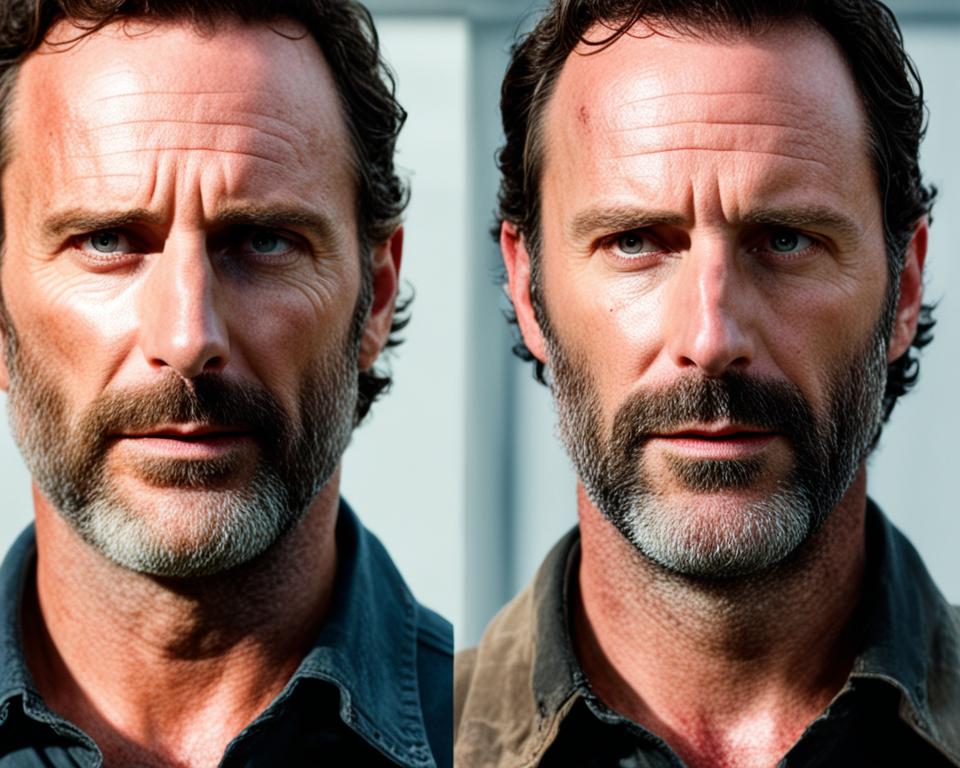
How Zombie Shows Redefine the Concept of Survival and Morality
Zombie shows, including “The Walking Dead,” subvert traditional notions of survival and morality. In these intense and unforgiving environments, characters are forced to make difficult decisions that challenge their moral compass and push the boundaries of what it means to be human. The relentless threat of the undead brings out both the best and the worst in people, showcasing the complexities of human nature and the lengths individuals will go to protect themselves and their loved ones.
By exploring the character development and moral dilemmas in zombie shows, we gain insight into the human condition and our own capacity for resilience and adaptation. These shows serve as a reflection of our fears, desires, and struggles, and provide thought-provoking narratives that transcend the confines of the undead genre.
The Evolution of Undead Entertainment: Tracing the Roots of Zombie Dramas
In this section, I will trace the fascinating evolution of undead entertainment and explore the origins of zombie dramas. From their humble beginnings in classic horror movies to the modern-day phenomenon of zombie-themed TV shows, the genre has undergone a remarkable transformation over time.
One of the earliest instances of zombie entertainment can be found in the 1932 film “White Zombie,” which introduced audiences to the concept of reanimated corpses and set the stage for future undead narratives. However, it wasn’t until the release of George A. Romero’s iconic film “Night of the Living Dead” in 1968 that zombies truly began to capture the public’s imagination.
Romero’s film, with its groundbreaking portrayal of flesh-eating zombies, gave birth to the modern zombie genre as we know it today. By combining elements of horror, social commentary, and survival, “Night of the Living Dead” paved the way for a new era of zombie dramas that would captivate audiences for decades to come.
Over the years, the zombie genre has seen numerous reinventions and reinterpretations. From fast-moving zombies in films like “28 Days Later” to comedic takes on the undead in movies like “Shaun of the Dead,” the range of storytelling possibilities within the genre is vast.
In the words of George A. Romero himself: “Zombies are the blue-collar monsters.”
This quote encapsulates the appeal of zombies in popular culture. They represent a primal fear of death and decay, making them a source of endless fascination for audiences. Additionally, zombies often serve as a metaphor for societal issues, reflecting our anxieties and fears about the world around us.
| Zombie Entertainment Milestones | Year |
|---|---|
| Release of “Night of the Living Dead” | 1968 |
| Dawn of the Dead becomes a cult classic | 1978 |
| Resurgence of zombie movies with “28 Days Later” | 2002 |
| Introduction of zombies in popular TV series “The Walking Dead” | 2010 |
The rise of zombie dramas on television, most notably with the debut of “The Walking Dead” in 2010, further solidified the genre’s popularity. The ongoing success of this series, along with the emergence of other zombie-themed shows like “Z Nation” and “iZombie,” showcases the enduring appeal of the undead in entertainment.
As audiences continue to be captivated by zombie dramas, the genre shows no signs of slowing down. With advancements in technology and storytelling techniques, we can expect even more innovative and engaging undead narratives in the years to come.
The Art of Undead Realism: Makeup and Special Effects in Zombie Dramas
One of the key elements that bring the undead to life in zombie dramas is the art of makeup and special effects. Through meticulous craftsmanship and creative techniques, talented artists transform actors into realistic zombies, immersing audiences into a world of horror and suspense.
Behind the Scenes: The Craftsmanship of Convincing Zombie Makeup
Creating convincing zombie makeup involves a combination of skill, artistry, and attention to detail. Makeup artists begin by prepping the actors’ skin and using prosthetics to add depth and texture to their features. By carefully layering makeup colors such as grays, greens, and purples, they can achieve the perfect blend of decay and rot.
Another crucial aspect of zombie makeup is the application of fake blood and wounds. Artists strategically place wounds on the actors’ bodies, making them appear torn and bitten. The use of specialized products, such as liquid latex and silicone, allows for the creation of realistic wounds that seem fresh and gory.
It’s not just about the physical transformation, though. Makeup artists also pay close attention to the actors’ movements and expressions, ensuring that their portrayal of zombies aligns with the visual effects. By collaborating closely with directors and actors, the makeup team brings their undead characters to life, enhancing the overall authenticity of the show.
Special Effects Magic: Elevating the Horror of Zombie Dramas
In addition to makeup, special effects play a crucial role in elevating the horror of zombie dramas. Through a combination of practical effects and CGI, visual artists create breathtaking scenes that shock and terrify viewers.
Practical effects involve using physical elements on set to achieve realistic and visceral scenes. This can include the use of prosthetic limbs, animatronics, and elaborate set designs. By incorporating practical effects into zombie shows, directors can create a sense of tension and unease, allowing audiences to feel fully immersed in the apocalyptic world.
CGI, or computer-generated imagery, also plays a significant role in enhancing the visual impact of zombie dramas. Whether it’s creating hordes of undead, showcasing gory injuries, or adding atmospheric elements, CGI allows for limitless possibilities in bringing the undead to life on screen. Skilled visual effects artists meticulously blend CGI with practical effects, ensuring a seamless integration that enhances the overall horror and realism of the show.
Together, the art of makeup and special effects in zombie dramas create a visually captivating experience for viewers. The meticulous craftsmanship of convincing zombie makeup combined with the magic of practical effects and CGI elevates the horror and immerses audiences in a world filled with terror and suspense.
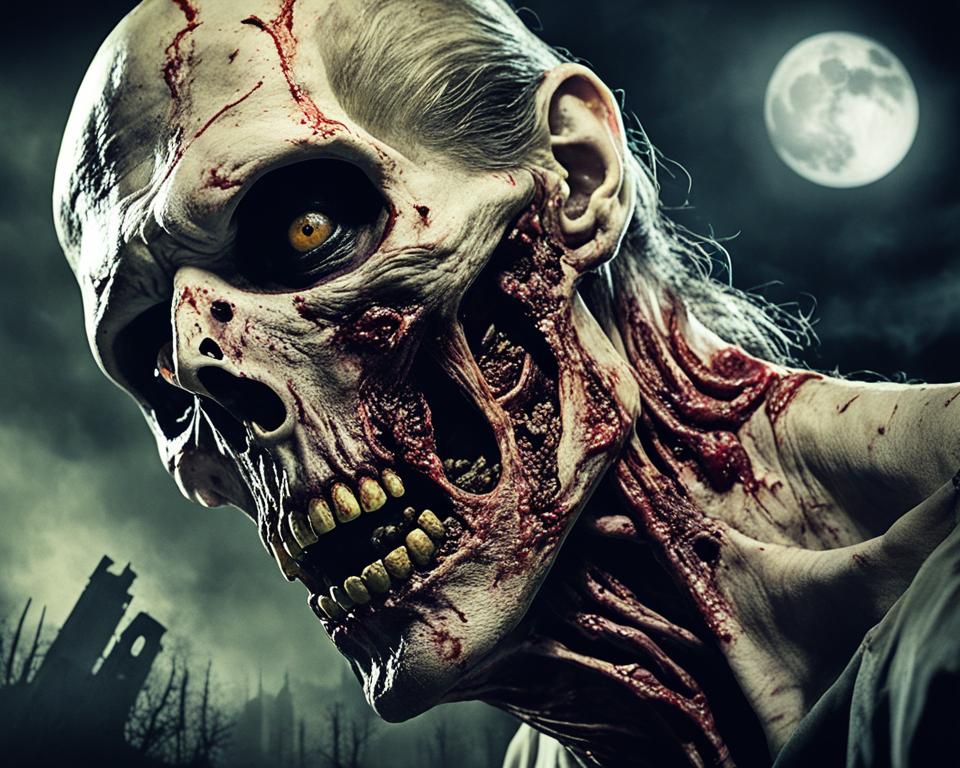
From Niche to Mainstream: The Infectious Spread of Zombie Popularity
The mainstream popularity of zombies is a testament to the contagious spread of zombie popularity in recent years. What was once a niche genre has now become a dominant force in the entertainment industry, captivating audiences worldwide.
There are several factors that have contributed to the rise of zombie popularity. One of the main reasons is the ability of zombie dramas to tap into deep-seated fears and anxieties. The undead, with their relentless pursuit and insatiable hunger, evoke a sense of terror and vulnerability that resonates with viewers.
Moreover, the metaphorical significance of zombies in media has played a crucial role in their mainstream appeal. These creatures often serve as reflections of societal decay, with zombie dramas exploring themes such as consumerism, class warfare, and the breakdown of social structures. The undead are more than just mindless monsters; they are symbols of the anxieties and challenges faced by modern society.
Another key factor in the infectious spread of zombie popularity is the evolution of visual effects and makeup techniques. The realistic and gruesome portrayals of the undead have captivated audiences, immersing them in a world where the line between life and death is blurred.
The rise of streaming platforms and the accessibility of zombie-themed content has also fueled the mainstream popularity of zombies. Audiences can now easily binge-watch their favorite shows, leading to a surge in zombie fandom and creating a dedicated community of enthusiasts.
As the infectious spread of zombie popularity continues, the entertainment industry has been quick to exploit the trend. From blockbuster movies to critically acclaimed TV shows, zombies have become a staple in popular culture, captivating audiences of all ages and backgrounds.
The contagious spread of zombie popularity shows no signs of slowing down, with the undead remaining a dominant force in the entertainment industry. Whether it’s the thrill of survival, the exploration of societal issues, or the fascination with the macabre, there’s no denying the enduring appeal of zombie dramas.
Zombies through the Decades: An Evolution of Horror’s Favorite Monsters
In the world of horror, few creatures have captivated audiences as consistently as zombies. These flesh-eating monsters have undergone a remarkable evolution over the decades, becoming icons of the horror genre. From their earliest appearances in black-and-white films to the modern-day zombie apocalypse series, the evolution of zombies reflects the changing tastes and fears of society.
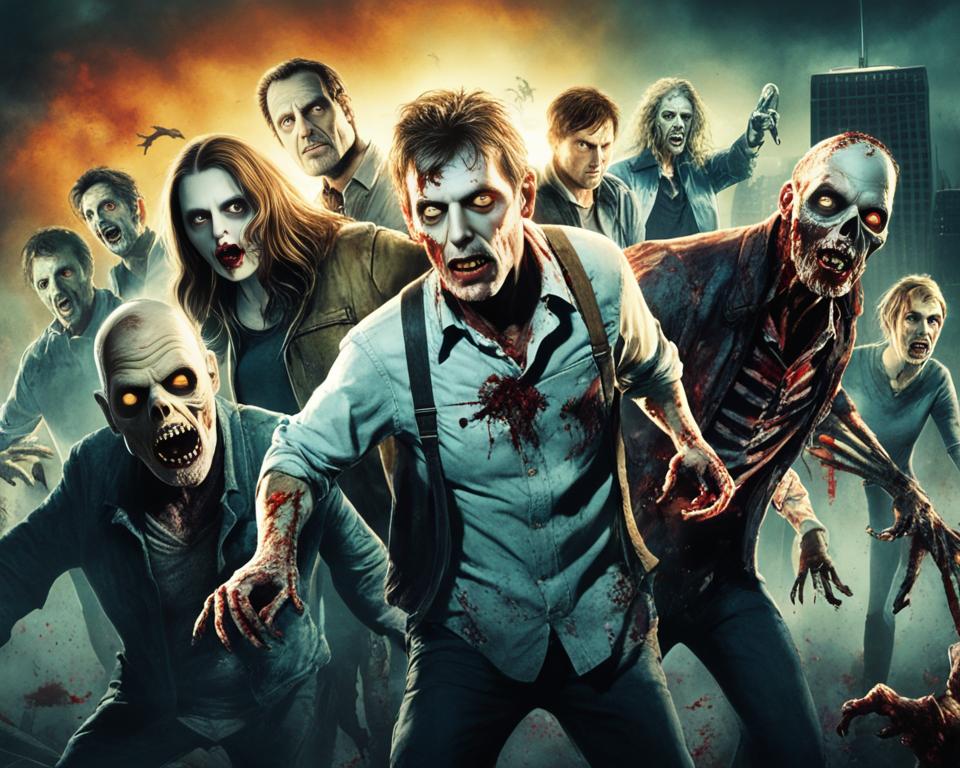
In the early days of zombies in cinema, they were often depicted as reanimated corpses, controlled by voodoo masters. These zombies were eerie and unsettling, representing the fear of losing control over one’s mind and body. As the decades passed, zombies took on new forms and characteristics, mirroring the cultural shifts and anxieties of each era.
In the 1960s and 1970s, zombie movies started to explore the concept of the undead as a reflection of societal decay and unrest. Filmmaker George Romero’s “Night of the Living Dead” (1968) revolutionized the genre by introducing slow-moving, flesh-eating zombies as a metaphor for social unrest and racial tensions. This film laid the foundation for the modern zombie archetype, setting the stage for future zombie narratives.
“Night of the Living Dead” was a game-changer in the horror genre, introducing zombies as not just mindless creatures but symbolic representations of deeper societal issues.
In the 1980s and 1990s, zombies continued to evolve, taking on a more gory and violent disposition. With films like “Dawn of the Dead” (1978) and “Braindead” (1992), audiences were exposed to graphic scenes of zombie mayhem and carnage. These movies highlighted the apocalyptic nature of zombie outbreaks and the desperate struggle for survival. Zombies became less metaphorical and more visceral, tapping into audiences’ primal fears.
Fast forward to the present day, and zombies have cemented their status as horror icons. The success of TV shows like “The Walking Dead” (2010-2022) and movies like “World War Z” (2013) has solidified their place in pop culture. Zombies have become a global phenomenon, captivating audiences with their relentless pursuit of human flesh and the exploration of survival in a post-apocalyptic world.
“The Walking Dead” had a profound impact on the depiction of zombies in popular culture, raising the bar for storytelling and character development in the genre.
The evolution of zombies throughout the decades showcases the enduring fascination with these horror icons. From their origins as voodoo-controlled corpses to their modern portrayal as relentless, flesh-eating monsters, zombies have captured the imaginations of audiences around the world. Whether they serve as metaphors for societal issues or embody our deepest fears, zombies continue to terrify and entertain, ensuring their place in the pantheon of horror.
| Decade | Zombie Characteristics | Representative Films |
|---|---|---|
| 1930s-1940s | Voodoo-controlled undead | White Zombie (1932) |
| 1960s-1970s | Metaphorical representations of societal decay | Night of the Living Dead (1968) |
| 1980s-1990s | Graphic violence and apocalyptic themes | Dawn of the Dead (1978), Braindead (1992) |
| 2000s-Present | Relentless pursuit of human flesh in post-apocalyptic settings | The Walking Dead TV series (2010-2022), World War Z (2013) |
Around the World in Zombie Tales: International Takes on the Undead Mythos
As the fascination with zombies transcends borders, it’s intriguing to explore the diverse interpretations and mythologies surrounding the undead in different cultures. From ancient folklore to modern pop culture, international zombie tales offer unique perspectives on the undead mythos.
In Japan, the zombie genre has evolved into a distinct subculture known as “zombie idols.” Blending elements of horror and pop music, these idols entertain fans with their catchy tunes and zombie-themed performances. This unique fusion of genres highlights the global appeal of zombies and their ability to adapt to local cultural contexts.
In Haiti, the concept of zombies has deep roots in voodoo practices. Here, zombies are perceived as individuals reanimated through mystical rituals. Voodoo priests are believed to have the power to raise the dead, creating a rich tapestry of ancient beliefs and supernatural folklore that have influenced zombie mythology around the world.
Meanwhile, in Mexico, the “Day of the Dead” celebration provides a vibrant backdrop for exploring the undead mythos. The festival, known as “Dia de los Muertos,” is a time to honor deceased loved ones and celebrate life. The depiction of colorful and animated skeletons during this festive period has contributed to the cultural representation of zombies in Mexican folklore.
International zombie tales showcase the diverse ways in which different cultures interpret and incorporate the undead into their storytelling traditions. From idol culture in Japan to voodoo practices in Haiti and the vibrant celebrations of the Day of the Dead in Mexico, each culture brings a unique perspective to the undead mythos. This global perspective on zombies further fuels the fascination and universality of their appeal.
Exploring international takes on the undead mythos allows us to appreciate the variety of cultural lenses through which zombies are viewed and understood. It reflects the universal themes of mortality, fear, and survival that transcend national boundaries and connect us as human beings. These global perspectives on zombies also highlight the power of storytelling to convey deep-rooted beliefs and provoke thought-provoking discussions about life and death.
| Culture | Undead Interpretations |
|---|---|
| Japan | Zombie idols: Combining horror and pop music |
| Haiti | Zombies in voodoo practices and mystical rituals |
| Mexico | Day of the Dead: Colorful celebrations and cultural representations |
Forecasting the Afterlife: The Future of Zombie Dramas in Entertainment
As the undead continue to shamble their way into pop culture, the future of zombie dramas holds immense potential. With the sustained popularity of these gripping narratives, it is evident that audiences crave more undead intrigue and suspense. To satisfy this growing demand, storytellers and creators are continually evolving the genre, bringing forth new trends and innovations in zombie storytelling.
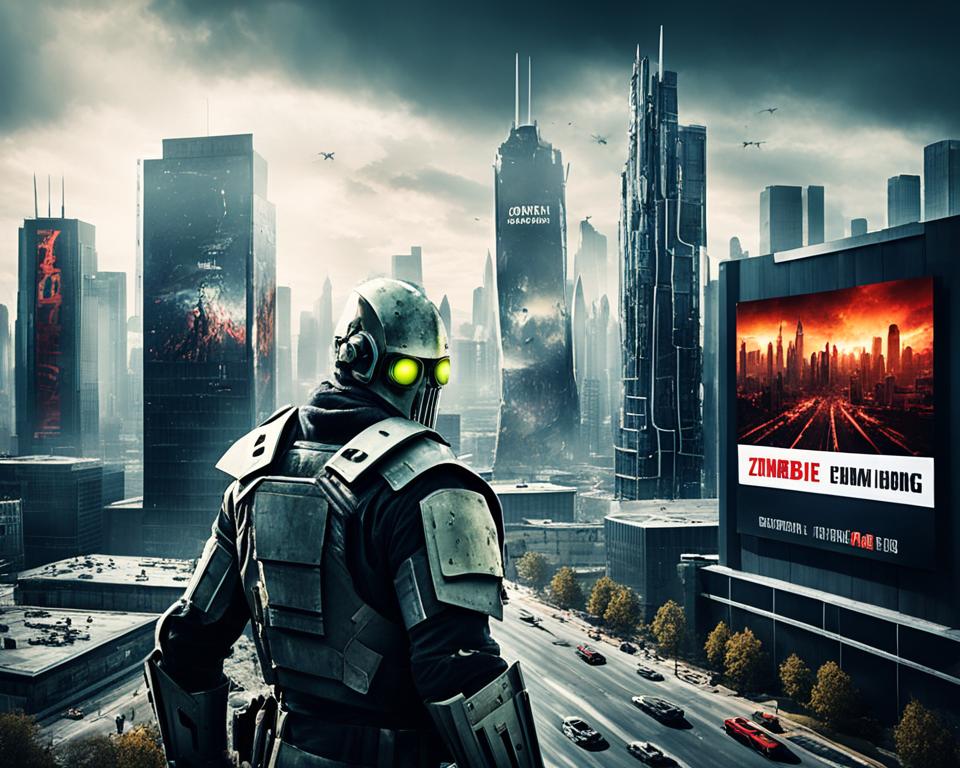
One of the key areas where zombie dramas are evolving is in their narrative exploration. While classic zombie stories primarily focused on survival and the relentless pursuit of flesh, modern zombie dramas are expanding to delve into deeper themes. The future of zombie storytelling will likely involve more complex character arcs, thought-provoking social commentary, and nuanced explorations of morality amidst the apocalyptic chaos.
New technologies and advancements in special effects have also played a significant role in shaping the future of zombie entertainment. With increasingly realistic makeup and visual effects, creators can push the boundaries of horror and immerse audiences in truly terrifying and believable undead worlds. These advancements will continue to enhance the overall viewing experience, heightening the tension and suspense that make zombie dramas so captivating.
Another exciting aspect of the future of zombie entertainment is the potential for cross-genre collaborations. As the lines between different genres continue to blur, zombie stories can be seamlessly woven into other narratives, such as science fiction, fantasy, or even romantic comedies. This blending of genres not only keeps the genre fresh and invigorating but also attracts new audiences who may not typically be drawn to traditional zombie dramas.
Furthermore, the future of zombie entertainment will likely see an increased global perspective. As the undead mythos spreads across different cultures and regions, we can expect diverse interpretations and unique storytelling approaches. Zombies have already become entrenched in various international narratives, and this trend is likely to continue as different cultures infuse their own mythologies and traditions into the undead lore.
In conclusion, the future of zombie dramas in entertainment promises exciting developments and captivating narratives. As the genre continues to evolve, audiences can look forward to more complex storytelling, advancements in visual effects, cross-genre collaborations, and diverse global perspectives. The undead’s grip on popular culture shows no signs of waning, ensuring that zombie dramas will remain an enduring fascination for years to come.
Conclusion
In conclusion, the enduring fascination with zombie dramas is a testament to their undying popularity in popular culture. Throughout this article, we have explored the cultural phenomenon surrounding these undead creatures and analyzed the factors that make them so compelling to audiences.
From their metaphorical significance in media to the psychological impact of apocalyptic storytelling, zombies have proven to be more than just mindless monsters. They serve as mirrors to contemporary anxieties, addressing societal issues such as consumerism and class warfare. Zombie dramas provide social commentary while entertaining viewers with thrilling storylines.
Character development amidst the chaos of a zombie apocalypse and the redefining of survival and morality are key aspects that have made these shows captivating. We have examined the evolution of the genre, tracing its roots from classic horror movies to modern-day television series.
As we forecast the future of zombie dramas, it is clear that this genre will continue to evolve and captivate audiences worldwide. The infectious spread of zombie popularity and the global perspectives on the undead mythos ensure that these entertaining tales will remain an integral part of our entertainment landscape.
